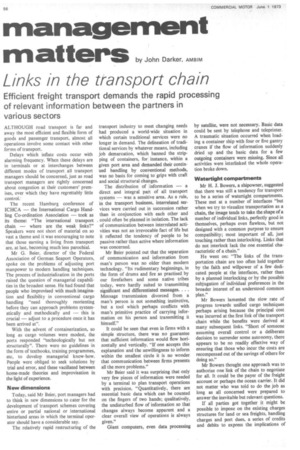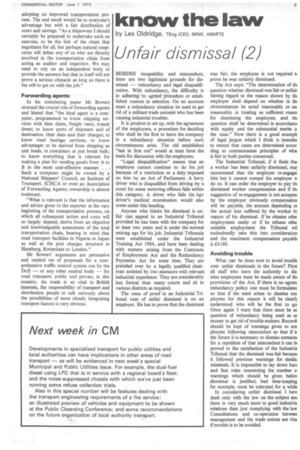management
Page 58

Page 59

If you've noticed an error in this article please click here to report it so we can fix it.
matters by John Darker, AMBIM
Links in the transport chain
Efficient freight transport demands the rapid processing of relevant information between the partners in various sectors
ALTHOUGH road transport is far and away the most efficient and flexible form of goods and passenger transport, almost all operations involve some contact with other forms of transport.
Delays which inflate costs occur with alarming frequency. When these delays are in terminals or at interchanges between different modes of transport all transport managers should be concerned, just as road transport managers are rightly concerned about congestion at their customers' premises, over which they have regrettably little control.
The recent Hamburg conference of ICHCA — the International Cargo Handling Co-ordination Association — took as its theme: "The international transport chain — where are the weak links?" Speakers were not short of material on so vast a theme and it was encouraging to note that those earning a living from transport are, at last, becoming much less parochial.
Mr G. Beier, director of the Federal Association of German Seaport Operators, spoke on the problems of adjusting port manpower to modern handling techniques. The process of industrialization in the ports raised the question of managerial capabilities in the broadest sense. He had found that people who improvised with much imagination and flexibility in conventional cargo handling "need thoroughly reorienting before they can approach problems systematically and methodically and — this is crucial — adjust to a procedure once it has been arrived at".
With the advent of containerization, so long as cargo volumes were modest, the ports responded "technologically but not structurally". There were no guidelines in the form of textbooks, training programmes, etc, to develop managerial know-how. People were obliged to seek solutions by trial and error, and these vacillated between home-made theories and improvisation in the light of experience.
New dimensions
Today, said Mr Beier, port managers had to think in new dimensions to cater for the development of transport schemes covering entire or partial national or international hinterland areas in which the terminal operator should have a considerable say.
The relatively rapid restructuring of the transport industry to meet changing needs had produced a world-wide situation in which certain traditional services were no longer in demand. The delineation of traditional services by whatever means, including job demarcation, which banned the stripping of containers, for instance, within a given port area and dernand.ed their continued handling by conVentional methods, was no basis for coming to grips with craft and social structural changes.
The distribution of information — a direct and integral part of all transport systems — was a sensitive area. As a rule, in the transport business, interrelated services were carried out in succession rather than in conjunction with each other and , could often be planned in isolation. The lack of communication between interrelated activities was not an irrevocable fact of life but it reflected the tendency of people to be passive rather than active where information was concerned.
Mr Beier pointed out that the separation of communication and information from man's person was no older than modern technology. "Its rudimentary beginnings, in the form of drums and fire as practised by our forefathers and some native tribes today, were hardly suited to transmitting significant and differentiated messages. . . . Message transmission divorced from a man's person is not something instinctive, but a tool which perhaps conflicts with man's primitive practice of carrying information on his person and transmitting it himself."
It could be seen that even in firms with a simple structure, there was no guarantee that sufficient information would flow horizontally and vertically. "If one accepts this explanation and the unwillingness to inform within the smallest circle it is no wonder that communication between firms presents all the more problems."
Mr Beier said it was surprising that only very few pieces of information were needed by a terminal to plan transport operations with precision. "Quantitatively, there are essential basic data which can be counted on the fingers of two hands; qualitatively, the undisturbed flow of information so that changes always become apparent and a clear overall view of operations is always given."
Giant computers, even data processing by satellite, were not necessary. Basic data could be sent by telephone and teleprinter. A traumatic situation occurred when loading a container ship with four or five gantry cranes if the flow of information suddenly dried up and the basic data for a few outgoing containers were missing. Since all activities were interlinked the whole operation broke down.
Watertight compartments Mr H. J. Bowers, a shipowner, suggested that there was still a tendency for transport to be a series of watertight compartments. These met at a number of interfaces "but when we try to visualize transportation as a chain, the image tends to take the shape of a number of individual links, perfectly good in themselves, perhaps even flawless, but not designed with a common purpose to ensure compatibility; most important of all, just touching rather than interlocking. Links that do not interlock lack the one essential characteristic of a chain."
He went on: "The links of the transportation chain are too often held together by the faith and willpower of a few dedicated people at the interfaces, rather than by a planned interlocking or by the possible subjugation of individual preferences in the broader interest of an understood common plan."
Mr Bowers lamented the slow rate of progress towards unified cargo techniques perhaps arising because the principal cost was incurred at the first link of the transport chain while the benefits were derived at many subsequent links. "Short of someone assuming overall control or a deliberate decision to surrender some autonomy, there appears to be no readily effective way of ensuring that those who incur the costs are recompensed out of the savings of others for doing so."
Mr Bowers thought one approach was to authorise one link of the chain to negotiate for all. It could be the payer of the freight account or perhaps the ocean carrier. It did not matter who was told to do the job as long as all concerned were prepared to answer the inevitable but relevant questions.
If all parties got together it might be possible to impose on the existing charges structures for land or sea freights, handling charges and port dues, a series of credits and debits to express the implications of adopting an improved transportation process. The end result would be to everyone's advantage but with a fair distribution of costs and savings. "As a shipowner I should certainly be prepared to undertake such an exercise, to be the link of the chain that negotiates for all, but perhaps natural suspicions will debar any of us who are directly involved in the transportation chain from acting as auditor and inquisitor. We may need to rely on an independent body to provide the answers but that in itself will not prove a serious obstacle as long as there is the will to get on with the job."
Forwarding agents In his stimulating paper Mr Bowers stressed the crucial role of forwarding agents and hinted that "the ideal agent is a computer, programmed to know shipping services with their dates, freight rates, transit times; to know ports of shipment and of destination, their dues and their charges; to know road haulage services; to know advantages to be derived from shipping • as unit loads, in containers or just break bulk; to know everything that is relevant for making a plan for sending goods from A to B in the most cost-effective manner. . . Such a computer might be owned by a National Shippers' Council, an Institute of Transport, ICHCA or even an Association of Forwarding Agents; ownership is almost irrelevant.
"What is relevant is that the information and advice given to the exporter at the very beginning of the transportation process, on which all subsequent action and costs will so largely depend, derive from an objective and knowledgeable assessment of the total transportation chain, bearing in mind that road transport facilities in Nigeria or Japan as well as the port charges structure in Hamburg, Rotterdam or London."
Mr Bowers' arguments are persuasive and remind me of proposals for a comprehensive traffic control system run by the DoE — or any other neutral body — for road transport, public and private, in this country. As trade is so vital to British interests, the responsibility of transport and distribution people to talk seriously about the possibilities of more closely integrating transport factors is very obvious.




































































































